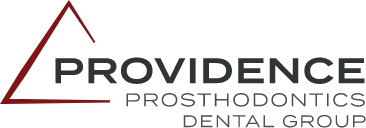Referring Doctors
Providence Prosthodontics Dental Group
Top 5 Reasons To Refer To A Prosthodontist
A prosthodontist is a valuable asset in the planning and delivery of care for patients with complex oral conditions. A prosthodontist’s training and experience are essential in treating situations that involve:
1. Treatment requiring several specialists
Patients with extensive rehabilitation involve care from multiple medical disciplines, which often present unique and time-consuming problems for a general dentist. Prosthodontists are trained to manage and appropriately stage the treatment needs of such patients. When the rehabilitaion is completed the patient returns to the referring general practitioner for continued maintenance and further dental care.
2. Intricate esthetic procedures
From the restoration of a single maxillary central incisor to the rehabilitation of an extremely worn dentition, pleasing esthetic and functional results are critical to both the patient and the practitioner. Prosthodontists are uniquely qualified by their training in the selection of dental materials and the use of various types of restorations to find the solution that fulfills each patients desires.
3. Complex implant-supported restorations
Patients with significant restorative problems may require an extensive multphase rehabilitation. This may include extraction of teeth, the surgical placement of implants and the fabrication of implant-supported crowns, bridges or complete arch prostheses. A prosthodontist can determine the appropriate restoration of your patient to restore both function and esthetics.
4. Challenging dental cases
Providing conventional or implant-supported dentures for edentulous patients with severely resorbed ridgees, vertial dimension discrepancies or significantly inadequate interarch space can be difficult. Treating dentate patients with extremely worn teeth, deep vertical overlap and/or a history of bruxism, clenching or Temporomandibular disorders also present a difficult scenario. The design and placement of dentures, crowns, bridges and removable partial dentures for such patients is often time consuming and frustrating. Treatment by a prosthodontist will ensure a successful outcome.
5. Comprehensive reconstructive dentistry
Patients with severe functional deficits resulting from trauma, cancer surgery or development defects such as a cleft palate or other craniofacial anomalies require treatment that deals not only with the current problem, but looks ahead to the future to avoid compromises in appearance as well as function (including speech, swallowing and chewing.) Prosthodontists possess the special skills and expertise required for a prosthetic replacement and maxillofacial structures (i.e. ear, nose) rehabilitation of severe burn scars, patient management during radiation therapy and sleep apnea treatment.
